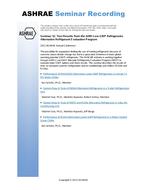This paper compares two models that were developed independently for predicting the particle separation efficiency of a vane-induced uniflow cyclone. The Zhang model was based on direct analysis and the Crawford model was based on indirect analysis. Both models were further derived to show that the particle separation efficiency depended on Reynolds number and particle property. Experimental data from a uniflow cyclone were collected to compare with the two models. Particle separation efficiencies of the uniflow cyclone were measured at three Reynolds numbers: 2.3×104, 4.1×104, and 5.9×104. The predictions using the Zhang model were closer to the experimental data. However, both models underestimated the particle separation efficiency compared with the experimental data.
Units: Dual
Citation: ASHRAE Transactions, vol. 111, pt. 1, Orlando 2005
Product Details
- Published:
- 2005
- Number of Pages:
- 8
- File Size:
- 1 file , 2 MB
- Product Code(s):
- D-25651


